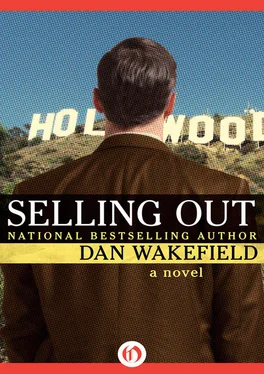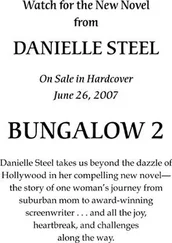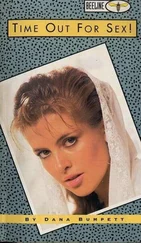“Frankly, I was grappling with the word grapple .”
“Luckily,” Ned said, looking at Perry, “we have our author here to elucidate.”
“Oh, well, I just meant the way people do—I mean, a young man and woman, recently married.”
He realized he was picturing a scene from his own first marriage and added quickly, “A couple like Jack and Laurie, I mean.”
“Naturally,” Ned said reassuringly.
“You know how people like that kind of grab each other, in an argument?” Perry asked.
“Like grabbing by the arm?” asked Kenton.
“Sure, right,” Perry said, not wanting to reveal how he and his first wife had rolled around someone’s gravel driveway in such an argument.
“Good,” Ned said. “That suits our couple, I think, better than a knock-down, drag-out, roll-around kind of thing.”
“We’ll get more frustration and fury by having them hold back a bit,” said Kenton.
“Exactly,” said Ned. “Keep it civilized.”
“Perfect,” echoed Perry.
When they saw the scene in dailies they agreed it was both civilized and dramatic.
It was not till the next day that they heard a dissenting opinion.
At the crucial moment of shooting the picnic love scene in an open field near the campus, a plane began circling overhead. The soundman took off his earphones and complained he was picking up the drone.
“Cut!” said Kenton.
All eyes of cast and crew turned upward. They not only saw a plane circling, they saw someone jump out. There was a gasp and several shrieks. Then a sigh of relief as a parachute opened. Perry followed Ned and Kenton as they ran toward the uninvited paratrooper, who landed at the far end of the field and was pulling in his chute.
It was Archer Mellis.
“What’s going on?” Ned asked.
“That’s what I want to know after looking at yesterday’s dailies,” said Archer. “Doesn’t anyone here know how to stage a real fight between a young married couple?”
“It was supposed to be understated,” Kenton said.
“ Civilized ,” Ned added with emphasis.
“I call it bloodless and boring,” said Archer.
Sweat popped out on Kenton’s brow, and the big vein in Ned’s temple began to throb as his face grew lobster red.
“What the hell do you really want, Archer?” Ned demanded. “Violence?”
Archer looked as if someone had just insulted his mother.
“I didn’t hear that,” he said. “I didn’t hear anyone in good conscience accuse me of resorting to something I entered this industry to oppose.”
“So what is it you want?” Kenton asked.
“I want that scene reshot.”
“I’m the executive producer here,” Ned said. “What are you trying to do, take over the picture?”
“I’m trying to save it,” said Archer, and, pulling in the last cords of his chute and balling it up, he strode toward the camera and crew.
As the lights went down in the small executive screening room at Paragon, Perry could feel his pulse rising. He was about to see his dream from beginning to end. This wasn’t even the final form of the film, it was only the rough cut, but it was the first time anyone except Kenton as the director and Kim as the film editor (along with her assistant) would view the work as a whole, in sequence, instead of just the disconnected pieces of the dailies. Perry was as nervous as if he were about to see a documentary of his own life on a large screen.
No matter how it came out, it would in a sense be a victory over many odds. There were times when Perry wondered if it ever would be finished, if the production would get past the conflicts and emergencies, the artistic tantrums and budget crises, the unexpected breakdowns of nerves and equipment, the acts of God, like the drenching rain that fell the day of reshooting the picnic scene (they used it to show Laurie and jack’s true grit by having them kiss and fondle under umbrellas).
From the time Archer Mellis landed in the field up at Saratoga like a paratroop guerrilla, challenging Kenton and Ned (and Perry by association), he came to seem almost like their adversary rather than their leader, relentlessly prodding and pressing, yet goading them on. They were the production company while he was the studio, a higher force, a more powerful critic and judge. Yet despite its disadvantages and tensions this new situation, if anything, brought the “First Year” company even closer together, made them more determined, more dedicated to their cause, and devoted to their eventual triumph.
The staff of the “First Year” company sat bunched together in the center of the first few rows of the screening room, while Archer Mellis, who had not come in the door but materialized at the last minute from inside the projection booth, sat in lofty isolation in the top row at the back of the room, his mouth a thin straight line, his eyes unblinking and inscrutable.
As the overhead lights in the room went out, the tiny lights attached to the clipboards of the professional filmmakers came on like the scattered glow of some exotic breed of illuminated insects. Perry again wished he had thought to ask Ned where you buy these things; he had never seen one for sale in an ordinary stationery store and presumed they could only be purchased at an official insiders’ supply house that sold such stuff as the black-and-white-striped slateboards, and the old-fashioned megaphones of the kind still used on the set by Roger, the crusty first assistant director on their production. Perry was far too nervous now to use a lighted clipboard for its purpose of making notes while the film was being shown; he would simply have liked to have had one as a security prop.
Better still, he had Jane beside him. He was glad now he’d overcome his apprehensions of breaking protocol by bringing his wife, and he gratefully reached over now and took her hand. He squeezed her fingers tightly as the first of the film began to flicker to life on the big screen in front of them.
A rough cut runs long by definition, but this one was longer than most, running thirty-eight minutes over. It was especially—almost scandalously—long for television, a medium which by necessity emphasizes economy of time as well as money. This two-hour movie for television would be cut to ninety-six minutes with commercials on a $2.1 million budget, with a nineteen-day shooting schedule, whereas a feature film of similar scope would probably run at least three times that in budget even without any stars, and three or four times in the length of the shooting schedule. A director of a feature might indulge himself in as many as fifty or sixty takes of one angle of one scene, while any more than five or six takes for television was considered excessive. Everyone was doing his best but there was no time for “art,” no extra hours much less days to spend in trying to get the slant of light just so across the cheek of the heroine at the moment the hero’s lips brushed ever so lightly across the top of her brow. The public was waiting, switching the dials; the television tubes were like millions of hungry mouths all over America, waiting to be constantly fed: Making television was like making bread, as opposed to the gourmet cakes and tarts of the features, and in Perry’s opinion, in many cases, the bread turned out better anyway.
A rough cut for a feature might run three or four hours over its eventual desired length, but in television anything more than ten minutes over was thought of as indulgent. Well, Kenton had wanted the luxury of this kind of indulgence and Ned had fought for him on it, and though Archer had sometimes fought back, he had himself demanded reshooting not only to get something just right by his standard but also to have what was considered in TV almost profligate—a choice.
Читать дальше












